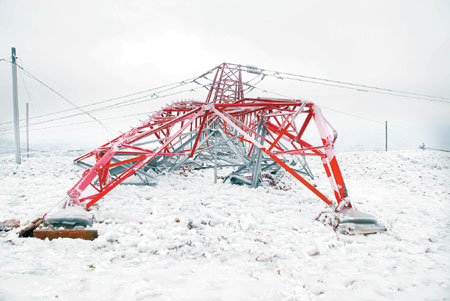Authorities put power supply top of agenda
Updated: 2008-01-29 08:18
The authorities are gearing up to restore fuel and power supplies in regions hit by the worst snowstorm in decades, officials said Monday.
 An electricity pylon lies crumpled on the ground on Saturday in DanZhai County, Guizhou Province after being weighed down by ice and snow. [China Daily] |
Heavy snow and sleet have stricken central, southern and eastern China in the past few days, paralyzing railways, roads and airports in eight provinces including Hunan, Anhui and Jiangsu.
The snow has severely disrupted transport and logistics, forcing a number of power plants to suspend operations because of fuel shortages.
"The situation is severely threatening people's livelihoods," Zhu Hongren, a senior official from the National Development and Reform Commission (NDRC) said Monday.
China, which generates 78 percent of its electricity from coal, suspended 7 percent of its coal-fired power plants after snowstorms disrupted the transportation of fuel.
Zhu said 17 provinces have suffered power shortages and the closure of coal-fired power plants has forced 13 provinces to ration power.
The government should make ensuring fuel supply a "top priority", Premier Wen Jiabao said at a conference held over the weekend.
To ease the coal shortage, the Ministry of Railways increased shipments to 36,000 train carriages a day on Saturday, Railway Minister Liu Zhijun said, an increase of 30 percent on the same time last year.
The Railway Ministry also said Monday it will work closely with power plants in snow-hit areas and increase coal transportation.
The ministry said it moves 33,000 train carriages of coal for power plants each day, the highest level so far.
The NDRC is also stepping up efforts to increase fuel supply.
It told Sinopec and CNPC, China's two largest oil producers, to ramp up fuel production and distribution Monday to help ease the fuel shortage.
The commission also told local governments to guarantee electricity supplies to residents first, and limit supplies to companies that are heavy polluters or known for their high energy consumption.
Hunan province was among the worst hit areas by the snow. Its Huanghua Airport in the provincial capital Changsha has been closed since Friday.
Airports in at least 10 cities, such as Wuhan, Nanjing and Changzhou, were closed temporarily Monday.
Meanwhile, power lines from the Three Gorges hydroelectric dam in Hubei province to Shanghai were damaged in the snowstorms, the Xinhua News Agency reported.
In the Sichuan capital Chengdu, blackouts were predicted as power companies struggled to meet demand for electricity following incessant snowfall since the beginning of the month.
The province's power company has said it is facing an electricity shortage of 70 million kWh.
Li Chuncheng, Party chief of Chengdu, said the city has enough power to meet only two-thirds of the demand from the public and local businesses.
Priority has been given to the public, he said.
The provincial government said there have been nearly 20,000 blackouts in the province this month.
Transport problems set to spur further price rises
Transport problems set to spur further price rises
Widespread snowstorms buffeting the country may further drive up consumer prices if disrupted travel on roads and rail is not restored soon, economists have said.
The disruption has caused a shortage of food and agricultural products, the Ministry of Commerce said on its website, while the Ministry of Agriculture said the wholesale price index of agricultural products surged to 174.8 points Monday, up from 155 points on Jan 1.
"These developments will likely push up near-term CPI inflation," Liang Hong, an economist with Goldman Sachs in Hong Kong, said.
The consumer price index (CPI) rose 4.8 percent last year, the highest rise in more than a decade. Food, which accounts for a third of the CPI basket, was a main driver of the inflation. Recently, the government has introduced several measures, including a temporary price freeze on some products, to prevent the price hikes evolving into overall inflation.
"Prices will rise further if transportation is not restored quickly," Chen Jijun, an analyst with CITIC Securities, said.
The Ministry of Commerce said this week that local authorities can deploy food reserves to deal with intense market fluctuations.
Local suppliers have also been urged to increase production of cooking oil, meat, eggs and vegetables.
|
|
|
||
|
||
|
|
|
|